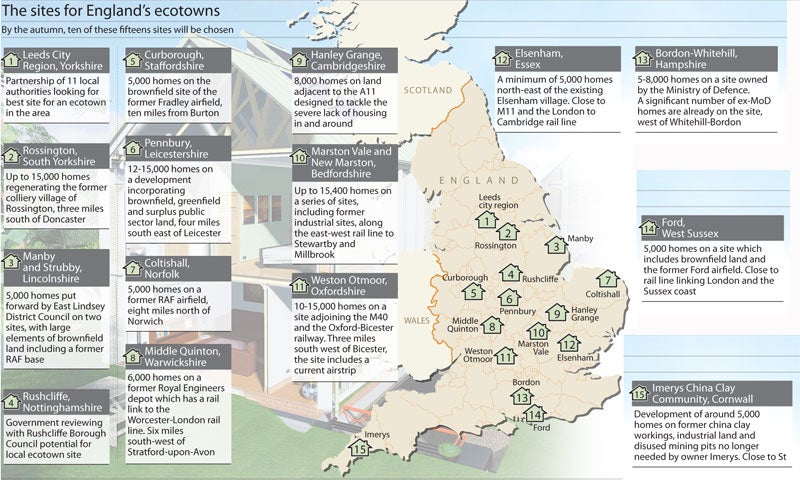Protesters' fury as ecotown shortlist targets 'unsustainable' locations

Fifteen locations across England earmarked as potential "ecotowns" were unveiled by the Government yesterday to a decidedly mixed reception.
The proposals for new settlements built to the highest environmental standards were welcomed by some as valuable steps towards easing the housing crisis. But critics complained that many of the sites were inappropriate – especially those in unspoilt countryside – and protest campaigns are likely.
The locations, announced by the Housing minister, Caroline Flint, have been whittled down from a total of 57 proposals submitted by developers after the Government announced its ecotowns competition last year.
The 15 locations, which range from Imerys China Clay Community in Cornwall to the Leeds area in West Yorkshire, will be further reduced to a total of 10 by a public consultation exercise which will end in the autumn. The final new settlements, of between 5,000 and 20,000 homes each, will be the first new towns built in Britain for 40 years, and be will constructed over the next decade as part of the Government's plans for three million new houses by 2020. The first five will be built by 2016.
Ms Flint said the ecotown schemes would help tackle the twin challenges of climate change and affordable housing, with the successful proposals having to supply between 30 per cent and 50 per cent affordable homes. The settlements will have to be zero-carbon as a whole and be an "exemplar" in at least one area of environmental sustainability, such as energy production or waste disposal.
None of them, Ms Flint said, would be sited on green-belt land. However, some are "greenfield" sites in open countryside, even if they do not have green-belt protection, and it is these which are likely to prove the focus of dissent from local residents and countryside campaigners.
There is already active opposition to plans for an ecotown of up to 15,000 homes at Weston Otmoor in Oxfordshire, where longtime local residents include the parents of the tennis player Tim Henman. Henman has backed protests against siting the new development on his parents' doorstep and yesterday his father, Anthony Henman, 67, said he would continue to fight government plans for the "horrendous" site, which he feared would destroy their village.
Other controversial sites which have angered local communities have made it on to the shortlist, including Pennbury in Lincolnshire, Middle Quinton, near Stratford-upon-Avon, Warwickshire, and Marston Vale and New Marston, Bedfordshire.
Many of the protests stem from fears that the new developments, which will have to go through a full planning process, will damage existing communities and put pressure on services and infrastructure.
The most vociferous critic of the schemes yesterday was the Campaign to Protect Rural England, which published detailed comments on each site and said: "The majority of proposals ... appear to be in unsuitable, unsustainable locations and conflict with established plans and strategies."
The Royal Town Planning Institute warned the Government that it risked creating "soulless Stepford Wives suburbia" if it did not ensure the new settlements were well-linked to existing developments, while the Local Government Association said they could become "the eco-slums" of the future if they were built without regard to where residents could get to jobs or training.
The Town and Country Planning Association welcomed the proposals. Its chief executive, Gideon Amos, said: "With a potential to deliver around 200,000 new homes, ecotowns are an essential part of the solution to the problem of delivering affordable homes at the highest environmental standards to families and households crying out for decent homes."
Among the 42 rejected locations were controversial sites in Hampshire, Oxfordshire and Derbyshire. Most were on green-belt land, threatened wildlife or were similar to projects that were previously denied planning permission.
They included Micheldever Station in Hampshire (as reported in yesterday's Independent), Grovewood in Derbyshire national forest, and Shipton Quarry in Oxfordshire, which is partly in the constituency of the Tory leader, David Cameron.
Join our commenting forum
Join thought-provoking conversations, follow other Independent readers and see their replies
0Comments